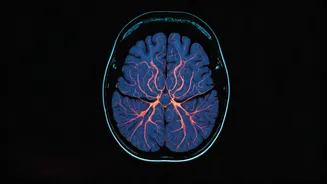Persistent Headaches
Headaches are common, but persistent or worsening headaches can be a significant symptom of brain cancer. These headaches often differ from typical tension
headaches or migraines. They may become more frequent, severe, and unresponsive to standard pain relief. A headache caused by a brain tumor can worsen over time, and might be most intense in the morning or accompanied by other symptoms like nausea or vomiting. The pain can feel dull, pressure-like, or throbbing, and its location may correspond to the tumor's location. If your headaches are unusual, changing in nature, or accompanied by neurological symptoms, it’s critical to seek medical evaluation. Early detection is key, as brain cancer prognosis depends largely on timely diagnosis and intervention.
Cognitive Changes
Cognitive changes encompass a variety of symptoms that can affect mental processes and functioning. Brain tumors can disrupt cognitive abilities, leading to memory problems, difficulty concentrating, or challenges with thinking and reasoning. These changes may involve issues with language, such as finding the right words or understanding speech. Patients might experience confusion, disorientation, or personality shifts. Such alterations can be subtle initially but worsen over time. These symptoms occur because the tumor puts pressure on or damages brain regions responsible for cognitive functions. Any noticeable changes in cognitive abilities, particularly when accompanied by other neurological symptoms, necessitate a prompt consultation with a healthcare professional to identify the cause and receive appropriate treatment.
Vision Changes
Vision changes can also signal the presence of a brain tumor. Tumors can exert pressure on the optic nerve or affect the visual cortex, causing a range of vision problems. These may include blurred vision, double vision, or loss of peripheral vision. Some individuals experience visual disturbances like seeing flashing lights or floaters. In some instances, the changes in vision occur gradually, while in others, they may appear suddenly. It's important to recognize that vision changes linked to brain tumors are often progressive. Anyone experiencing persistent or unusual changes in vision should seek immediate medical attention. Regular eye exams can help detect early signs of cardiovascular issues, but changes in vision not explained by other issues can indicate problems within the brain.
Balancing Problems
Balancing problems can be associated with brain tumors, as the cerebellum and brainstem play crucial roles in maintaining balance and coordination. Tumors in these areas can disrupt these functions, leading to unsteadiness, difficulty walking, and a higher risk of falls. Patients may experience dizziness, vertigo, or a sensation of spinning. The severity of balance problems can vary, and they may worsen over time. They might manifest as a general lack of coordination or clumsiness. The presence of balance issues, particularly when accompanied by other neurological symptoms, calls for a thorough medical evaluation. Detecting the underlying cause early improves outcomes. It’s always best to be cautious.
Other Symptoms
Beyond the more common symptoms, there are other signs to watch for. New-onset seizures can be a critical sign of a brain tumor. The tumor can irritate brain tissue, leading to uncontrolled electrical activity in the brain. Other less-specific symptoms include nausea, vomiting (especially in the morning), and changes in appetite. Some patients may experience weakness or numbness in certain parts of the body, speech difficulties, or changes in hearing. The presence of any of these symptoms, particularly when they appear suddenly or without a clear explanation, requires a prompt medical assessment. It is important to remember that these symptoms can occur due to various causes. However, awareness is important. Any unexplained neurological changes should prompt a visit to a doctor.













